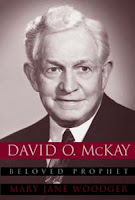Amazing Grace
Last Saturday's Salt Lake Tribune (27 April) contained "A call to grace" written by Tribune journalist Peggy Fletcher Stack. It's the story of Jonathan Hays, a newly ordained Christian minister serving in New Song Presbyterian Church (PCA) in Salt Lake City.
Rev. Hays is unique in that he's the first pastor in Utah's PCA Church that is from Utah. According to the Tribune article, the Senior Pastor at New Song said,
"All the other pastors have moved from other places," [Rev. Samuel] Wheatley says. "We need insiders [like Hays] who automatically understand the challenges of Protestant ministry in a predominantly Mormon culture. They know the true points of difference and true points of similarity between the two and what needs to be articulated much more clearly."
Rev. Hays fits the bill. Growing up very active in the LDS Church, part of a multi-generational Mormon family, Jonathan Hays began looking into the history of Mormonism while he was at college. He
...was troubled by some of what he read, particularly the practice of polygamy, which the LDS Church abandoned in 1890. He could no longer reconcile what he read with what he heard from contemporary Mormon leaders.
"I left the LDS Church, not to become something else, but because I didn't think I could be LDS anymore," he says. "I kinda had a phase of rebellion. I was upset that God would let me be part of something that wasn't true."
Coming into contact with Christians who had "a real relationship with Jesus," Jonathan began to long for spiritual life. He decided to go to church one Sunday morning, but not knowing where to go, he chose the church closest to his home.
"What I experienced there was amazing," he says. "I heard grace and I saw grace and it blew me away because I had never seen or heard it before. I knew going in there that I wasn't good enough. I had seen it throughout my life as I tried to be a good Mormon; I knew I couldn't do it."
That night he prayed his own version of the "sinner's prayer" -- that his life was "screwed up" and he needed help.
"I didn't know the right way to pray, but I saw Jesus and so I leapt for him," he says.
Well, Jesus, ever faithful, caught Jonathan Hays. I'm willing to bet Rev. Hays now sings Psalm 40, verses in which all the redeemed in Christ rejoice:
I waited patiently for the Lord;
He inclined to me and heard my cry.
He drew me up from the pit of destruction,
out of the miry bog,
and set my feet upon a rock,
making my steps secure.
He put a new song in my mouth,
a song of praise to our God.
Many will see and fear,
and put their trust in the Lord.
This is God's amazing grace.
Labels: Christianity, Grace







